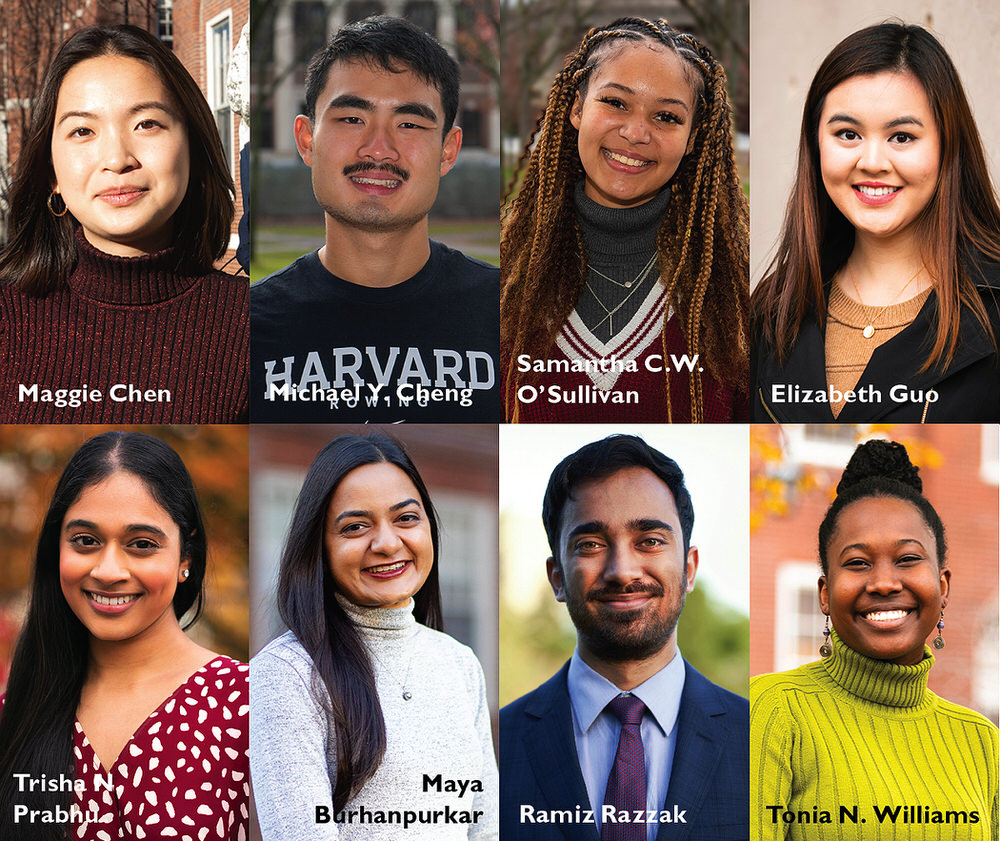ARTS FIRST, finally
The annual campus celebration of performance and creativity is scheduled to return in person April 28-May 1. The Harvard Arts Medalist will be Rubén Blades, L.M. ’85, the polymathic Panamanian salsa and jazz musician, singer, composer, actor, etc. Add patience to his attributes: Blades was the intended honorand in 2020, before the pandemic. He will have a conversation with festival creator/emcee John Lithgow ’67, Ar.D. ’05, perform with students, and receive his medal on April 28. Find details at https://ofa.fas.harvard.edu/arts.
Supreme Court-Bound
Having lost three times in its eight-year-old litigation against the consideration of race as a factor in college admissions—at trial and on appeal against Harvard, and at trial against the University of North Carolina—Students for Fair Admissions, the anti-affirmative action group, has now won at least the penultimate prize. The U.S. Supreme Court on January 24 agreed to hear the two cases on appeal, likely in its fall 2022 term. Given past rulings on the issue, extending to the 1978 Bakke decision, and the changed composition of the Court since the Trump administration filled three seats, its decision to hear the cases raises the possibility that Harvard’s current admissions procedures will be modified, if not overturned outright. For details, see harvardmag.com/supreme-affirmative-22.
John Comaroff Suspended
Foster professor of African and African American Studies and of anthropology John Comaroff, on paid administrative leave since August 2020 pending investigation of allegations of sexual harassment and retaliation, has now been sanctioned. In late January, Faculty of Arts and Sciences dean Claudine Gay announced that Comaroff was “found to have engaged in verbal conduct” that violated the faculty’s sexual and gender-based harassment and professional-conduct policies. He was placed on administrative (unpaid) leave for the spring term, and prohibited from teaching required courses or taking on additional graduate-student advisees during the 2022-2023 year; current advisees have the opportunity to switch to other advisers. Gay will determine whether to restore his academic privileges at the end of the period.
College Cohort
The College announced in mid December that it had admitted 740 of 9,406 early-action applicants to the class of 2026, or 7.9 percent. Of more lasting interest, it announced that the option to apply without submitting standardized-test scores, adopted for pandemic-affected applications to the classes of 2025 and 2026, will continue for the next four years (read more details at harvardmag.com/7-9-early-apps-21). The shift was widely interpreted in higher-education circles as a further step toward phasing out such tests entirely, as California has recently done. On January 25, the College Board announced that the SAT would go online, and be shortened to two hours, beginning in 2023 for international students and the following year in the United States.
Graduate-Student Contract
After a brief fall-term strike, and nearly another, the Harvard Graduate Students Union and University agreed on a second contract, lasting four years. The union won pay raises for salaried workers of 5 percent, 4 percent, 3 percent, and 3 percent, and a $20 minimum for hourly workers (escalating to $21 by 2023). Although it did not get Harvard to budge on the primacy of University processes for hearing Title IX cases, it did win provisions for appellate arbitration for other discrimination and harassment cases, and a legal-support fund for those going through the Title IX process. Funding for benefits was also increased substantially.
Charles Lieber Convicted
Friedman University Professor Charles Lieber, then chair of the department of chemistry and chemical biology, who was arrested in early 2020 and charged with misleading the U.S. government about his work for a Chinese government-sponsored research program (see harvardmag.com/lieber-20), was convicted in December on charges involving false statements and four tax-reporting and financial offenses. Though the convictions do not directly concern U.S. claims about China’s potential espionage or improper appropriation of scientific work (and charges against MIT’s Gang Chen were dismissed in January), the trial highlighted continuing Sino-American tensions focused on economically and strategically important discoveries.
The Financial-Aid Front
Bolstered by a $40-million anonymous gift, Dartmouth has extended its need-blind admissions policy to international applicants—joining the exclusive company of Harvard, Princeton, Yale, Amherst, and MIT.…Rice University, which has been expanding its student body aggressively and investing in new facilities and programs, has now extended its financial-aid package to eliminate the loan component for all students who quality for need-based aid. It also raised to $75,000 the family-income level for full grant-aid awards.…A lawsuit filed in federal court in January alleges that 16 need-blind colleges, including Brown, Columbia, Cornell, Dartmouth, Duke, MIT, Penn, Rice, and Yale illegally reduce financial-aid offers by operating a price-fixing cartel. Schools willing to comment said they complied fully with federal law.

Photographs of students by Harvard Public Affairs and Communications staff photographers: Stephanie Mitchell, Rose Lincoln and Jon Chase. Photograph of Ramiz Razzak by Daniel Huang
Student Scholar Roster
Maggie Chen ’22 has been named a Marshall Scholar. Classmates awarded U.S. Rhodes Scholarships include Michael Y. Cheng, Samantha C.W. O’Sullivan, Elizabeth Guo, and Trisha N. Prabhu. Seniors Maya Burhanpurkar and Ramiz Razzak won Canadian honors, and Graduate School of Education student Tonia N. Williams, of Spanishtown, Jamaica, rounded out the Rhodes roster. As they all study in England, eight students and alumni who were named Schwarzman Scholars will study at Tsinghua University in Beijing: seniors Corbin Duncan, Emilly Fan, John Ferguson, Nicholas Maxwell, and Michael Richmond; plus Kunho Kim ’17, James Bedford ’20, and medical student William Ge.
On Other Campuses
Following its agreement to absorb Pine Manor College, Boston College announced a two-year, residential college program for underrepresented and first-generation students, and committed $100 million to the venture.…Investment manager William H. Miller III has given $50 million to the physics and astronomy program at Johns Hopkins, following his $75-million gift to that institution’s philosophy department in 2018.…As it renovates Kline Tower, the landmark structure atop its Science Hill, Yale has established an eponymous Institute for the Foundations of Data Science to accelerate basic and applied research and teaching in the burgeoning field.…Separately, as New Haven struggles with budget deficits and large debts, Yale agreed to increase its voluntary payments to the city by $52 million during the next six years, and to fund a Center for Inclusive Growth with $5 million during that period in an effort to stimulate economic opportunities in the city.
Nota Bene
Research role. Dudley professor of structural and economic geology John H. Shaw has been appointed vice provost for research, overseeing research strategy and policies University-wide. He succeeds Richard D. McCullough, now president of Florida State University. Shaw, who is also professor of environmental science and engineering, has focused his scientific work on faults in the earth’s crust and earthquakes.
Governor at government. Deval L. Patrick ’78, J.D. ’82, LL.D. ’15, former Massachusetts governor, has been appointed professor of the practice of public leadership and co-director of the Center for Public Leadership at the Harvard Kennedy School.
Miscellany. Louise Richardson, Ph.D. ’89, former professor at Harvard (she is an expert on terrorism) and executive dean of the Radcliffe Institute, and vice-chancellor of both the University of St. Andrews and Oxford, has been appointed president of the Carnegie Corporation of New York, effective next January.…M. Elizabeth Magill, executive vice president and provost of the University of Virginia, has been appointed president of the University of Pennsylvania effective July 1, succeeding the long-serving Amy Gutmann ’71,Ph.D. ’76.…The Wyss Institute for Biologically Inspired Engineering (see harvardmag.com/wyss-gift3-19) has leased a 107,000 square-foot facility being constructed on Brookline Avenue, specially outfitted for its research needs; occupancy is planned for the spring of 2023.…Menzel professor of astrophysics Charles R. Alcock concluded 17 years of service as director of the Harvard-Smithsonian Center for Astrophysics on January 1.…Fisher research professor of natural history Andrew Knoll (see “Life’s Beginnings,” September-October 2013, page 29, and “Transitions Gradual and Cataclysmic,” a May-June 2020 book review, page 58), has won the 6-million kronor Crafoord Prize in Geosciences.…The sale of edX, founded and led by Harvard and MIT, to the for-profit, online-learning company 2U, announced last June, was completed in November (see “edX Exit,” September-October 2021, page 25).…As consumer prices accelerated, the services-oriented Higher Education Price Index remained at a moderate 2.7 percent for fiscal year 2021, ended last June 30.









